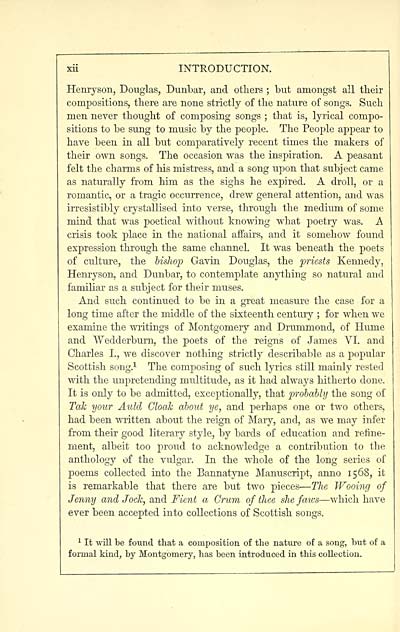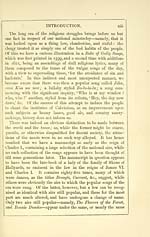Glen Collection of printed music > Printed text > Songs of Scotland prior to Burns
(16) Page xii
Download files
Complete book:
Individual page:
Thumbnail gallery: Grid view | List view

xii INTRODUCTION.
Henryson, Douglas, Dunbar, and others ; but amongst all their
compositions, there are none strictly of the nature of songs. Such
men never thought of composing songs ; that is, lyrical compo-
sitions to be sung to music by the people. The People appear to
have been in all but comparatively recent times the makers of
their own songs. The occasion was the inspiration. A peasant
felt the charms of his mistress, and a song upon that subject came
as naturally from him as the sighs he expired. A droll, or a
romantic, or a tragic occurrence, drew general attention, and was
irresistibly crystallised into verse, through the medium of some
mind that was poetical without knowing what poetry was. A
crisis took place in the national affairs, and it somehow found
expression through the same channel. It was beneath the poets
of culture, the bishop Gavin Douglas, the priests Kennedy,
Henryson, and Dunbar, to contemplate anything so natural and
familiar as a subject for their muses.
And such continued to be in a great measure the case for a
long time after the middle of the sixteenth century ; for when we
examine the writings of Montgomery and Drummond, of Hume
and Wedderburn, the poets of the reigns of James VI. and
Charles I., we discover nothing strictly describable as a popular
Scottish song. 1 The composing of such lyrics still mainly rested
with the unpretending multitude, as it had always hitherto done.
It is only to be admitted, exceptionally, that probably the song of
Tak your Auld Cloak about ye, and perhaps one or two others,
had been written about the reign of Mary, and, as we may infer
from their good literary style, "by bards of education and refine-
ment, albeit too proud to acknowledge a contribution to the
anthology of the vulgar. In the whole of the long series of
poems collected into the Bannatyne Manuscript, anno 1568, it
is remarkable that there are but two pieces — The Wooing of
Jenny and Jock, and Fient a Crum of thee she faws — which have
ever been accepted into collections of Scottish songs.
1 It will be found that a composition of the nature of a song, but of a
formal kind, by Montgomery, has been introduced in this collection.
Henryson, Douglas, Dunbar, and others ; but amongst all their
compositions, there are none strictly of the nature of songs. Such
men never thought of composing songs ; that is, lyrical compo-
sitions to be sung to music by the people. The People appear to
have been in all but comparatively recent times the makers of
their own songs. The occasion was the inspiration. A peasant
felt the charms of his mistress, and a song upon that subject came
as naturally from him as the sighs he expired. A droll, or a
romantic, or a tragic occurrence, drew general attention, and was
irresistibly crystallised into verse, through the medium of some
mind that was poetical without knowing what poetry was. A
crisis took place in the national affairs, and it somehow found
expression through the same channel. It was beneath the poets
of culture, the bishop Gavin Douglas, the priests Kennedy,
Henryson, and Dunbar, to contemplate anything so natural and
familiar as a subject for their muses.
And such continued to be in a great measure the case for a
long time after the middle of the sixteenth century ; for when we
examine the writings of Montgomery and Drummond, of Hume
and Wedderburn, the poets of the reigns of James VI. and
Charles I., we discover nothing strictly describable as a popular
Scottish song. 1 The composing of such lyrics still mainly rested
with the unpretending multitude, as it had always hitherto done.
It is only to be admitted, exceptionally, that probably the song of
Tak your Auld Cloak about ye, and perhaps one or two others,
had been written about the reign of Mary, and, as we may infer
from their good literary style, "by bards of education and refine-
ment, albeit too proud to acknowledge a contribution to the
anthology of the vulgar. In the whole of the long series of
poems collected into the Bannatyne Manuscript, anno 1568, it
is remarkable that there are but two pieces — The Wooing of
Jenny and Jock, and Fient a Crum of thee she faws — which have
ever been accepted into collections of Scottish songs.
1 It will be found that a composition of the nature of a song, but of a
formal kind, by Montgomery, has been introduced in this collection.
Set display mode to: Large image | Transcription
Images and transcriptions on this page, including medium image downloads, may be used under the Creative Commons Attribution 4.0 International Licence unless otherwise stated. ![]()
| Special collections of printed music > Glen Collection of printed music > Printed text > Songs of Scotland prior to Burns > (16) Page xii |
|---|
| Permanent URL | https://digital.nls.uk/90575930 |
|---|
| Description | Scottish songs and music of the 18th and early 19th centuries, including music for the Highland bagpipe. These are selected items from the collection of John Glen (1833 to 1904). Also includes a few manuscripts, some treatises, and other books on the subject. |
|---|
| Description | The Glen Collection and the Inglis Collection represent mainly 18th and 19th century Scottish music, including Scottish songs. The collections of Berlioz and Verdi collected by bibliographer Cecil Hopkinson contain contemporary and later editions of the works of the two composers Berlioz and Verdi. |
|---|
![[Page xi]Introductory historical sketch](https://deriv.nls.uk/dcn4/9057/90575920.4.jpg)
